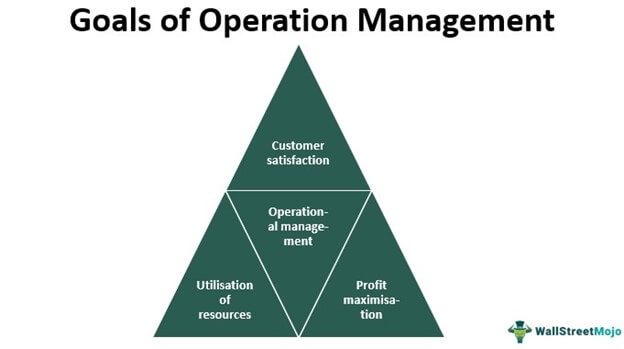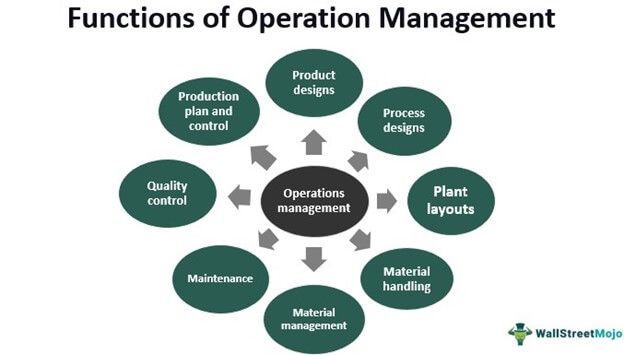Table Of Contents
Operations Management Meaning
Operations management is a business area that implements practices ensuring the conversion of inputs into goods and services with maximum efficiency. The goal is to increase an organization's income by improving its operations and maximizing the use of existing resources. It also includes the provision and delivery of excellent customer service.

Management of the operations department is essential to achieve optimal utilization of resources. It ensures that goods or services of appropriate specification and cost are produced within the stipulated time. As a result, an organization will achieve good rates of profit and adequate levels of customer satisfaction when all these coincide.
Key Takeaways
- Operations management deals with the management of processes and operations in an organization. Its primary aim is to improve its profit through optimal utilization of resources and customer service.
- It involves active coordination from various other departments such as production, sales, accounting, and customer service.
- It is a key component of balancing the cost incurred by the organization and the achievement of operating profit.
- Operations management responsibilities include giving attention to production and process design, layout design, control of inventory
- and raw materials, distribution, proper sales and marketing, delivery of customer service, etc.
Operations Management Explained
Operations management in business involves converting input into efficient outputs to achieve desired results. In other words, it aims to improve profits by achieving customer satisfaction. This is done by fulfilling customer requirements and realizing the organization's management objectives. Operations management is, therefore, a vast field and can involve product and process designs, plant layouts, material management, maintenance, quality control, production plan, and control, etc.
The operating system is the central point of any business operations management. It is the design to work out resource utilization processes and operations. It converts the available inputs such as capital, labor, raw materials, and information to create desired outputs effectively. The creation of goods or services involves many transformational processes such as storage, transportation, cutting, etc.
As the name suggests, a typical operations manager is responsible for managing the overall operations process. Accordingly, these managers shall oversee activities related to designing products and processes, planning on achieving targets, controlling resources and activities, and productivity improvement. They also have to indirectly interact with managers of other functional areas of the organization such as production, marketing, finance, accounting, human resources, etc. Therefore, the role of an operations manager in itself gives us the importance of operations management.
Roles & Responsibilities of Operations Management

The various functions of operations management are listed below:
#1 - Forecasting
Forecasting is an attempt at predicting the future with the help of systematic analysis and scientific methods. It is an essential part of operations management as it assesses the controllable and uncontrollable factors and makes predictions for the organization. It may also involve provisions or suggestions for dealing with those predicted scenarios.
#2 - Capacity Planning
Capacity measures the rate of the production capability of a facility. One of the most important operations management responsibilities is finding out the kind and quantity of capacity needed and the time by which it needs to be produced. It involves assessing the facility's current capacity, forecasting future needs, identifying and analyzing possible resources to fulfill those needs, evaluating alternative resources, and selecting the best among them.
#3 - Location Facility
It is important to determine a location facility of the plant that can ensure maximum operating efficiency. For example, a coal plant is best located near a water source with the availability of coal near; it provides efficiency, cost control, and profit. But the selection of facilities is based on the easy and regular supply of labor, resources, and raw materials. Factors like nearness to the market, power availability, transportation facilities, climate suitability, and government rules are also considered. An ideal location contributes to an organization's smooth working, the opposite of which will hinder its growth.
#4 - Layout
A good plant layout plans for placement of machines, pieces of equipment, utilities, service areas, storage areas, and arrangement of other facilities. In addition, it ensures a safe workspace, ease of maintenance, fulfillment of requirements, and long-run efficiency in its operations with minimal investment.
#5 - Integration of Activities
Successful execution of an organization's operations includes cordial and efficient workflow between various departments such as sales, production, and accounting. The Operations management system ensures the allocation of financial resources for purchases from the accounting department, receiving products from the production department, making the product reach the sales department, and effective delivery of goods or services from the customer service department. In addition, it ensures there is uninterrupted functioning of the organization through back and forth communications, continuous coordination, and feedback.
Examples
These examples give a basic understanding of the functions of operations management.
Example #1
Sam is an operations manager of a mobile phone manufacturing company called "ABC ltd." The company wants to sell a batch of new phones. Therefore, the responsibilities Sam needs to fulfill are:
- Ensure the products are designed to meet the criteria of customer expectations through analysis of past data.
- Predict the future requirements through analysis and ensure that the production amount meets the demand in the market.
- Secure the supply chain system. It involves arranging raw materials and delivering the same, maintaining existing inventory, ensuring a successful smooth production process, confirming the production numbers, distributing them in the market, and guaranteeing their sales.
- Ensuring there is no loss incurred from the organization's side by evaluating the cost and best alternatives available. This reduces the overall cost and overhead costs, efficient processes, and timely delivery of goods and services.
Example #2
One of the biggest companies in the U.S, Amazon, is a good example of successful operations management. It is an online retailer with its headquarters in the U.S. which started as an online bookstore and later evolved into an e-commerce retailer and an online marketplace.
To stand out, it had to begin with building a strong brand image. Hence, it created a robust supply chain. As a result, it made its services highly efficient, faster, and capable of catering to many customers. This led to the introduction of the Amazon prime service that allowed customers to get their products delivered to them within a short time. Apparently, the refreshing idea of faster deliveries from an e-commerce company attracted a lot of new customers.
The company developed a supply chain that had end-to-end visibility equipped with advanced technologies to allow the company takes control of all aspects of it. The company also automated its warehouse management and established multiple delivery stations to ensure faster delivery. Presently, with its enormous success and popularity, Amazon is one of the prime examples that show how effective operations management can benefit an organization.
